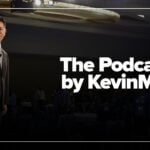Last fall, more than 20,000 first-year medical students donned white coats, pushing total U.S. medical school enrollment to nearly 100,000. Yet despite this surge of new trainees, the American Association of Medical Colleges projects a shortage of up to 86,000 doctors by 2036.
The strain is already evident. Each year, tens of thousands of American physicians pack up their stethoscopes and scalpels and leave medicine, citing burnout, administrative overload, and eroding autonomy. In a recent survey, one in four academic physicians said they planned to leave medicine within the next two years. As this cycle of attrition and entry accelerates, it forces us to rethink how we prepare students not just to become physicians, but to remain in the profession.
In the spring of my first year of medical school, I received an email about an elective called Mind-Body Medicine. The course, developed in 2002 by Dr. Aviad Haramati, helps students reflect on their lives and use those insights to cultivate self-awareness and long-term self-care.
Each week for 11 weeks, ten of us met for two hours to explore wellness practices meant to build resilience. The exercises varied in difficulty and in how directly they related to medicine. In the first week, we kept a gratitude journal, writing down three things we were grateful for each day. By the end of the week, our notebooks brimmed with small joys.
Medical school is often described as drinking from a fire hose. That journal became a release valve, easing just enough pressure to help me hold onto a more hopeful outlook.
Another week, we focused on nature walks—a practice I now rely on daily. After the preclinical years, medical students leave the classroom for the wards, operating rooms, and clinics, sometimes working up to 80 hours a week before heading home to study more. On my busiest rotations, I took any chance to slip outside and feel the sun on my face before returning to my notes. It was simple, but it fed my well-being and reminded me that it mattered, too.
The course ended with my favorite exercise: Rewriting the Hippocratic oath in our own words, nearly a year after we had first recited it. On the wards, my version became a quiet guide in moments without a clear protocol. It reminded me to check in on long-term patients before my weekends off, letting them know who would see them the next morning. It reminded me to call a patient’s mother, who was home with a newborn, to update her on her older son’s condition. On harder days, it helped me reconnect with the reasons I chose to do this in the first place.
Perhaps the most important lesson this elective offered wasn’t in a single exercise—it was learning how to lean on others. Early in medical training, students rotate through teams for short spurts, ranging from days to months, amidst endless permutations of residents, students, and attending physicians. In that ever-shifting environment, it helped to have a group of peers I could turn to, and the vocabulary to speak openly about what we were experiencing.
Studies of mind-body electives reflect this experience. Graduates of Georgetown’s Mind-Body Medicine course are more likely, even years later, to use these practices themselves and to recommend them to patients. The benefits extend beyond students—faculty facilitators of these groups report lower perceived stress and greater mindfulness compared with their peers. The benefits are undeniable, yet my involvement with the course happened purely by chance. As an elective, it falls outside the standard curriculum, and many classmates never discover it at all.
The preclinical years teach us perseverance: Just keep swimming. For many physicians, that mindset follows them into residency and clinical practice. But clearly, that model is flawed. Nearly half of the physicians in this country suffer from burnout, and 300 to 400 die by suicide each year. While these trends are often blamed on growing administrative burden and frustration with the health care system, meaningful reform has been slow, and little is done to help trainees cope in the current environment.
The skills I learned in our course, when woven together, became a raft that kept me afloat in the sea of challenges that come with caring for the sick. As students, we witness beautiful, scary, life-changing moments. Just days after delivering my first baby, I found myself holding another mother’s hand as her surgeon explained she would need an emergency hysterectomy. She had just welcomed her first child. Now, her last. When it was time for me to make it to the other side of these experiences, the raft was there.
While medical school prioritizes perseverance, programs like Mind-Body Medicine are essential for trainees to build resilience. With its framework, we don’t just survive challenges. We learn from them and become better caregivers for it.
In medicine, we believe in practice. It’s why, when we’re learning how to suture, we spend weeks repeating each stitch on silicone pads. We understand that only through practice can we be prepared when it truly matters. If we don’t teach medical students how to build their rafts now, how can we expect them to be ready when the storms hit? Without a structured focus on cultivating these skills, we risk losing yet another generation of physicians. If we fail, their loss will be felt by us all.
Seetha Aribindi is a medical student.





















![AI censorship threatens the lifeline of caregiver support [PODCAST]](https://kevinmd.com/wp-content/uploads/Design-2-190x100.jpg)
